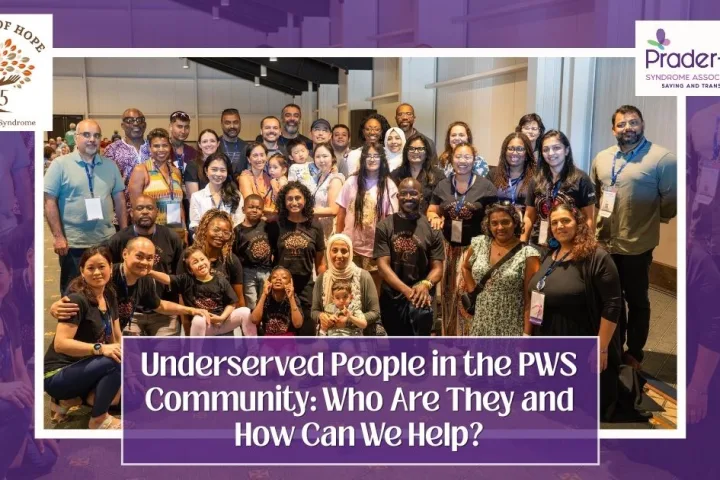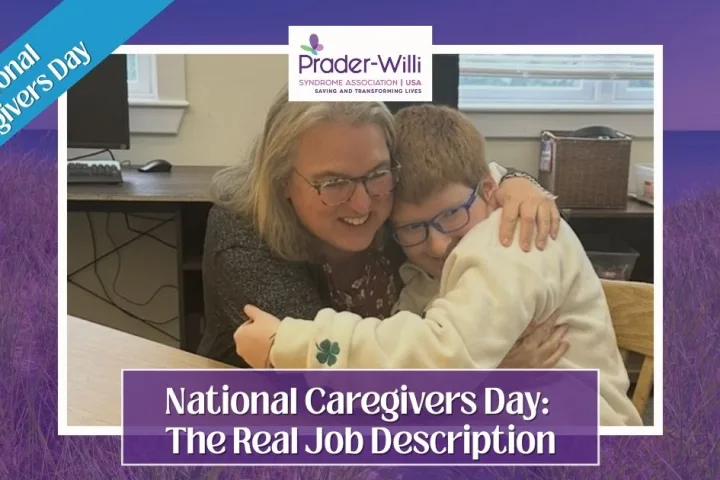PWSA (USA) is aware that the threat of illness is always a potential danger to those with PWS, their families and community. We advise our families to be extra vigilant in their efforts to prevent the spread of viral illness especially at this time when COVID-19 is likely to be present in their communities at some point. We urge our community to only go to trusted sites and their medical professionals for information on this particularly infectious virus. Below is the link to the Centers for Disease Control (CDC) website where you can get the facts and answers to many of your questions.
https://www.cdc.gov/coronavirus/2019-ncov/community/index.html
Symptoms of a COVID-19 infection can include fever, cough, myalgia (muscle aches) and fatigue. Some individuals with a COVID-19 infection develop shortness of breath. This is a serious progression of the disease and can lead to respiratory failure. Breathing difficulties warrant urgent medical attention.
Many of the symptoms of a COVID-19 infection can be similar to other viral illnesses including the flu. Testing can diagnose a COVID-19 infection, but our testing ability is limited at the current time. Hopefully this improves in the near future. It should also be noted that some individuals, especially children, can be asymptomatic with a COVID-19 infection, but they can still pass the infections on to others.
Factors that can increase the risk of a serious infection with COVID-19 are co-morbid conditions like hypertension, diabetes, cardio-vascular disease, chronic respiratory infections, obesity, and being over 60 years old.
Special considerations for PWS: Many individuals with PWS have temperature dysregulation so they might not manifest with a fever when they have an infection. Underlying respiratory conditions are also a problem in many with PWS. Remember: Breathing difficulties warrant urgent medical attention. A high pain threshold is something also to keep in mind when medically evaluating a person with PWS.
It is important to remember that persons with PWS do not always present with typical symptoms when ill, and they may be at risk for a delay in identification of illness because of this. Arbitrary things such as subtle changes in behavior, sleeping patterns or increase in anxiety can indicate an impending illness. Your health care provider should have a high level of suspicion if any symptoms of the virus occur.
Remember to have your Medical Alert Booklet with you when seeking medical care in any setting. If you need an updated copy download it here:
https://www.pwsausa.org/wp-content/uploads/2018/04/MedicalAlert-April2018.pdf
It may also be helpful to have a copy of the Medical Overview of PWS pamphlet for a quick reference for health care providers:
Medical Overview of PWS
More medical information can be found on our website at:
https://www.pwsausa.org/medical-issues-a-z/
What can you do right now?
Avoid large gathering of people and crowded places.
Avoid cruise ship travel.
Avoid non-essential travel such as airline travel.
People with a COVID-19 infection, even if asymptomatic, should self-quarantine for 14 days.
Practice everyday preventive actions now:
- Remind everyone in your household of the importance of practicing everyday preventive actions that can help prevent the spread of respiratory illnesses:
Practice good personal health habits and plan for home-based actions:
- Avoid close contact with people who are sick.
- Stay home when you are sick, except to get medical care.
- Cover your coughs and sneezes with a tissue.
- Clean frequently touched surfaces and objects daily (e.g., tables, countertops, light switches, doorknobs, and cabinet handles) using a regular household detergent and water.
- If surfaces are dirty, they should be cleaned using a detergent and water prior to disinfection. For disinfection, a list of products with Environmental Protection Agency (EPA)-approved emerging viral pathogens claims, maintained by the American Chemistry Council Center for Biocide Chemistries (CBC). Always follow the manufacturer’s instructions for all cleaning and disinfection products.
- Wash your hands often with soap and water for at least 20 seconds, especially after going to the bathroom; before eating; and after blowing your nose, coughing, or sneezing. If soap and water are not readily available, use a hand sanitizer that contains at least 60% alcohol. Always wash your hands with soap and water if your hands are visibly dirty.
For the specific recommendations from the Presidential Task Force on COVID-19 prevention go to: https://www.cdc.gov/coronavirus/2019-ncov/downloads/workplace-school-and-home-guidance.pdf





 Perry A. Zirkel has written more than 1,500 publications on various aspects of school law, with an emphasis on legal issues in special education. He writes a regular column for NAESP’s Principal magazine and NASP’s Communiqué newsletter, and he did so previously for Phi Delta Kappan and Teaching Exceptional Children.
Perry A. Zirkel has written more than 1,500 publications on various aspects of school law, with an emphasis on legal issues in special education. He writes a regular column for NAESP’s Principal magazine and NASP’s Communiqué newsletter, and he did so previously for Phi Delta Kappan and Teaching Exceptional Children. Jennifer Bolander has been serving as a Special Education Specialist for PWSA (USA) since October of 2015. She is a graduate of John Carroll University and lives in Ohio with her husband Brad and daughters Kate (17), and Sophia (13) who was born with PWS.
Jennifer Bolander has been serving as a Special Education Specialist for PWSA (USA) since October of 2015. She is a graduate of John Carroll University and lives in Ohio with her husband Brad and daughters Kate (17), and Sophia (13) who was born with PWS. Dr. Amy McTighe is the PWS Program Manager and Inpatient Teacher at the Center for Prader-Willi Syndrome at the Children’s Institute of Pittsburgh. She graduated from Duquesne University receiving her Bachelor’s and Master’s degree in Education with a focus on elementary education, special education, and language arts.
Dr. Amy McTighe is the PWS Program Manager and Inpatient Teacher at the Center for Prader-Willi Syndrome at the Children’s Institute of Pittsburgh. She graduated from Duquesne University receiving her Bachelor’s and Master’s degree in Education with a focus on elementary education, special education, and language arts. Evan has worked with the Prader-Willi Syndrome Association (USA) since 2007 primarily as a Crisis Intervention and Family Support Counselor. Evans works with parents and schools to foster strong collaborative relationships and appropriate educational environments for students with PWS.
Evan has worked with the Prader-Willi Syndrome Association (USA) since 2007 primarily as a Crisis Intervention and Family Support Counselor. Evans works with parents and schools to foster strong collaborative relationships and appropriate educational environments for students with PWS. Staci Zimmerman works for Prader-Willi Syndrome Association of Colorado as an Individualized Education Program (IEP) consultant. Staci collaborates with the PWS multi-disciplinary clinic at the Children’s Hospital in Denver supporting families and school districts around the United States with their child’s Individual Educational Plan.
Staci Zimmerman works for Prader-Willi Syndrome Association of Colorado as an Individualized Education Program (IEP) consultant. Staci collaborates with the PWS multi-disciplinary clinic at the Children’s Hospital in Denver supporting families and school districts around the United States with their child’s Individual Educational Plan. Founded in 2001, SDLC is a non-profit legal services organization dedicated to protecting and advancing the legal rights of people with disabilities throughout the South. It partners with the Southern Poverty Law Center, Protection and Advocacy (P&A) programs, Legal Services Corporations (LSC) and disability organizations on major, systemic disability rights issues involving the Individuals with Disabilities Education Act (IDEA), Americans with Disabilities Act (ADA), and the federal Medicaid Act. Recently in November 2014, Jim retired.
Founded in 2001, SDLC is a non-profit legal services organization dedicated to protecting and advancing the legal rights of people with disabilities throughout the South. It partners with the Southern Poverty Law Center, Protection and Advocacy (P&A) programs, Legal Services Corporations (LSC) and disability organizations on major, systemic disability rights issues involving the Individuals with Disabilities Education Act (IDEA), Americans with Disabilities Act (ADA), and the federal Medicaid Act. Recently in November 2014, Jim retired.